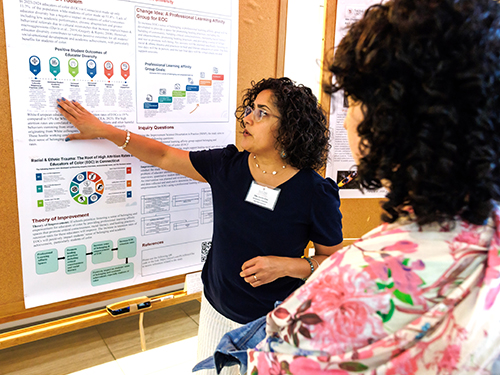
Sixth-Year Degree in SEAL
Inclement Weather: February 25, 2026
All classes starting prior to 11 a.m. will be remote. Classes after 11 a.m. will be in person. Non-essential staff should work remote until 11 a.m. then report to campus as scheduled.
In This Section
In This Section
Our programs in Educational Leadership continue from the Intermediate Administrator Certification (092) to a Sixth-Year Degree in Social, Emotional & Academic Learning for Social Justice Leadership.
Sixth-Year Degree in SEAL (Social, Emotional & Academic Learning) for Social Justice Leadership
This program is designed for those interested in further study in administration and will provide you with the required credits beyond the Master's degree to advance the 092 endorsement from provisional to professional. The Sixth-Year Degree in SEAL consists of an additional 15 credits beyond the 18 credit Intermediate Administrator Certificate program (33 total credits to earn the degree). The SEAL coursework is offered completely online and can be completed in as little as one year.
Many students who complete this program continue on to doctoral studies. Candidate who complete their full 33 credit Sixth-Year in SEAL for Social Justice Leadership at SHU are eligible to waive up to 12 credits in our Doctor of Education in Educational Leadership.
This experiential program engages candidates in such a way that their core professional ideas, experiences, and questions they hold central for becoming a school leader are identified, reflected on, and engaged in an authentic manner. Graduates move on to be dynamic, engaged and ethical leaders in the 21st Century.
Required Courses
This course is the first course addressing social and emotional learning (SEL). In completing this foundational course, students will establish an understanding of the history of the field of emotion science, the current SEL research, and related foundations of neuroscience. Looking through the lens of 21st-century societal context and challenges in education, as developing "emotion scientists and practitioners", students will integrate learnings to explore and develop their personal SEL skill set and competencies, as well as examine potential applications of foundational learning to SEL problems of practice in their own contexts.
This course is designed to prepare students to think critically about how key elements of social justice - fairness, equity, excellence for all - intersect with public education. Students analyze the effectiveness of efforts to improve access to high quality schooling and academic outcomes for all students. Using a Social Justice lens, students examine case studies and initiatives at the school, district and state/federal policy level. They develop action plans that advance fairness and equity of opportunity for all students, focusing on the opportunity and achievement gaps between historically privileged and underserved populations.
This course is designed to support candidates, regardless of their literacy background, to become Literacy Leaders for their schools and districts. Through lectures, reading, research, group work, and practice opportunities, students will develop (1) a foundation in the science of reading instruction grounded in the Modified Cognitive Model of Reading and the "Simple View" situated in the Gradual Release of Responsibility Framework, (2) assessment literacy to inform instruction and monitor progress, (3) fluency with differences between content area literacy and disciplinary literacy, (4) an understanding of principles of andragogy, (5) strategies for supporting at-risk and EL students, and (6) a resource file to support parents and the community in supporting their engagement in literacy.
This course prepares students to be professionals and leaders within an inclusive educational system. Students learn about federal legislation for the education of individuals with disabilities, and examine the relationship between legislation and special education procedures. Students also build a foundation of knowledge related to practices that support children with disabilities in public schools. The course particularly focuses on critical contemporary issues, including the following: least restrictive environment, data-based decision-making, evidence-based practices, and collaboration with families.
Educational leaders are tasked with improving the teaching and learning in content areas in which they may not have formal training. This course provides educational leaders with the knowledge base needed to effectively lead mathematics instruction and improve student outcomes in numeracy in K-12 schools and districts. From understanding research-based approaches and cognitive theory, learning progressions, and Response to Intervention, candidates will develop the understandings and capacities that can lead to improved student learning.
More Information
The Latest in Farrington College of Education & Human Development
View More News-
 AcademicsPublished:With proper planning, you can approach this academic milestone with confidence
AcademicsPublished:With proper planning, you can approach this academic milestone with confidence -

What Are the Best Master’s Degrees for Philosophy Majors?
AcademicsPublished:Turn your critical thinking into meaningful impact -

New Organizational Transformation Fellows Named
Academics, Advancing SHUPublished:Faculty and staff will collaborate on projects that advance workplace culture, professional growth and organizational change




